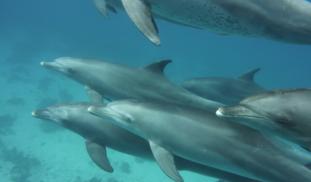Please wait...
About This Project
All animals sleep, but cetaceans engage in unihemispherical sleep, where brainwaves show that only half the brain sleeps at a time. Most studies of cetacean sleep have been in captivity. Reports of confirmed sleeping behaviour in the wild are rare. Expanding on findings of potential sleep behaviour in tagged harbour porpoise, we will review videos of bottlenose dolphins in the Red Sea to see if the same behaviours are present and can be linked to closed eyes: a strong indication of sleeping.
More Lab Notes From This Project

Browse Other Projects on Experiment
Related Projects
Out for blood: Hemoparasites in white-tailed deer from the Shenandoah Valley in Northern Virginia
Our research question centers about the prevalence and diversity of hemoparasites that infect ungulate poplulations...
Cyanova: A modular, budget photobioreactor for the efficient cultivation of microalgae
Microalgae are overlooked constantly as a protein source because of it's high costs and complex maintenance...
Using eDNA to examine protected California species in streams at Hastings Reserve
Hastings Reserve is home to three streams that provide critical habitat for sensitive native species. Through...



